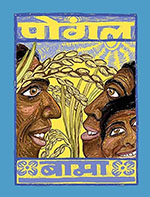Festival: the very word conjures up images of good food and new clothes. And yet, whose is the celebration? What does a festival mean to the dispossessed, the marginalized? Bama’s Pongal takes this head on, with the very first sentence, ‘Pongal after Pongal, Madasami would pay his respects to his landlord and do whatever he had to, as tradition demanded. It was thus that this Pongal, too, he collected whatever was required and got ready to go.’
For Madasami, who works as a farmhand, having previously failed in several minor businesses, primarily because ‘caste’ folk would not touch the tea or eatables he made and served, the greatest festival of the year meant taking a rooster, a large pumpkin, a large bunch of bananas and a sack of rice—stuff he and his family could ill afford—to the landowner who, in return, gave him a small measure of cooked pongal and a cheap towel. This year, Esakkimuthu, the only one of Madasami and Rakkamma’s seven or eight children to have gone to school, refuses to participate in this humiliating ritual, logically arguing that they could eat for several days if they kept the gifts for themselves.
However, Madasami and his wife, Rakkamma, tradition-bound, go off to make the presentation. But the landlord, who had watched, from his terrace, the argument between the parents and the son, decides to punish them by withholding even the cheap towel that he gifted them every year. The powerful story ends with Madasami recognizing the force of his son’s argument and the exploitation that forms the core of the traditional practice.
Esakkimuthu, we learn, despite having qualified to become a teacher, continues jobless and wanders around working for daily wages. While indicating the transformative power of education, the author has woven in a scathing commentary on the social order which manages to keep the downtrodden permanently marginalized. The tragedy of our educational system, however, is that other than exceptions like Esakkimuthu, the majority who go to school emerge without questioning ‘tradition’. Pongal should be essential reading for a beginning towards that transformation.
The fabulous illustrations by Karen Haydock multiply the raw power of the story.
This is a book that should find a place in every school library across India.
November 2023, volume 47, No 11

